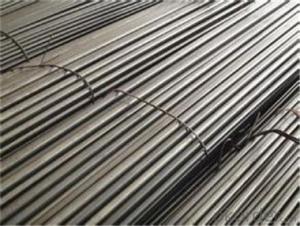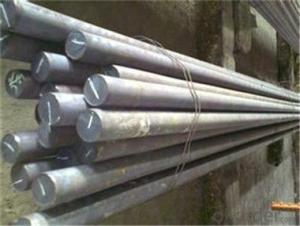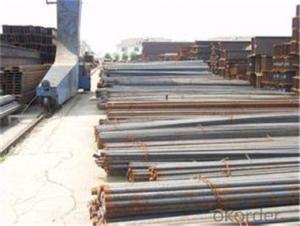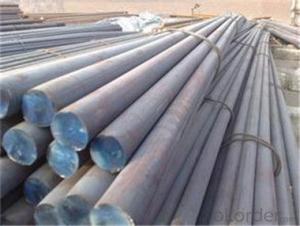A36 Steel Round Bars from China with High Quality
- Loading Port:
- Shanghai
- Payment Terms:
- TT OR LC
- Min Order Qty:
- 500 m.t.
- Supply Capability:
- 2000000 m.t./month
OKorder Service Pledge
OKorder Financial Service
You Might Also Like
Description of steel round bar:
1.Diameter 80 to 800 mm
2.Black or Bright surface
3.Annealed or Quenched and tempered provided
4.Cutting service provide. Carbon steel rod applies to chemical industry, shipping industry,
manufacturing industry,construction,decorate Industry,electric power,
pump shafts, sanitary wares,furniture handles,boiler,high temperature
resistant,low temperature resistant, corrosion resistant.
Festures of steel round bar:
4340 Forged Round Steel Bar
1.Dia 80-800mm Length:2000-13000mm or as required
2.Technique:Forged
3.Delivery Time:45 days
Specifications of steel round bar:
1. Standards: AISI 4340 8620 8640 4320 , JIS SNCM8 GB:40CrNiMoA
2. Specification: Dia: 80~450mm Length:2000-13000mm or as required
Images of steel round bar:
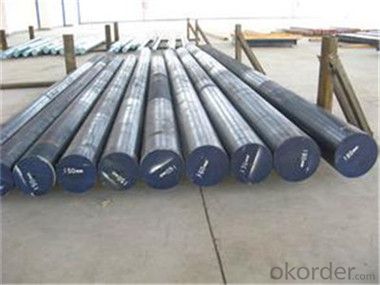
FAQ:
1. What is your package?
Packing situation: standard seaworthy packing or as customer required.
2. How long is the lead time?
Delivery time: 45 days after order confirmed.
3. What payment term do you accept?
Payment: T/T or L/C at sight.
- Q:Can steel round bars be used in the oilfield equipment industry?
- Steel round bars have a wide range of applications in the oilfield equipment industry. They are highly favored for their remarkable strength, durability, and resistance to corrosion. In fact, they are extensively utilized in the manufacturing of numerous components and equipment, including drill collars, drill bits, valves, and pump shafts. By incorporating steel round bars, the oilfield industry ensures that its equipment can endure the severe conditions and immense pressures encountered during operations. Furthermore, steel round bars can be effortlessly welded and machined to meet particular specifications, adding to their versatility and making them an optimal selection for the oilfield sector.
- Q:How are steel round bars used in the manufacturing of fasteners and bolts?
- Fasteners and bolts often rely on the strength and durability of steel round bars. These bars serve as the primary material for creating the shaft or body of these components. The manufacturing process involves several steps. Initially, the steel round bars are cut to the desired length according to the specifications of the fastener or bolt. Subsequently, the bars are heated to a specific temperature to soften the steel, making it easier to shape. Once heated, the bars are placed in a machine called a thread roller. This machine employs a series of hardened steel dies to form the threads onto the surface of the round bar. By pressing against the rotating bar, the dies create the spiral shape of the threads. This threading process is crucial as it ensures a secure attachment of the fastener or bolt to other components or structures. After the threads are formed, the round bars are trimmed to their final required length for the fastener or bolt, guaranteeing the correct size and fit for the intended application. Finally, the finished round bars undergo further processing to apply necessary surface treatments or coatings. These may include galvanizing or the application of a corrosion-resistant coating to safeguard the fastener or bolt from environmental factors that could compromise its performance. In conclusion, steel round bars play a vital role in the manufacturing of fasteners and bolts. They serve as the main material for the shaft or body, providing the essential strength and durability. Through various manufacturing processes, such as cutting, heating, threading, and surface treatments, these round bars are transformed into high-quality fasteners and bolts, which are integral components across a wide range of industries and applications.
- Q:Can steel round bars be used for making shock absorber components?
- Absolutely! When it comes to constructing shock absorber components, steel round bars are a fantastic choice. The reason being, steel possesses exceptional qualities including robustness, longevity, and the ability to withstand wear and tear. By utilizing steel round bars, it becomes possible to craft a multitude of shock absorber elements, including piston rods, mounting brackets, and tube bodies, through either machining or forging methods. The incorporation of steel guarantees that these components can endure the immense pressures and forces linked to shock absorption, thereby ensuring vehicle stability and seamless functionality.
- Q:What are the different types of steel round bar alloys used in the aerospace industry?
- In the aerospace industry, various steel round bar alloys are commonly used to meet the specific demands of different applications. These alloys have been specifically designed to meet the rigorous requirements of the aerospace sector, including the need for high strength, corrosion resistance, and lightweight properties. 1. Stainless Steel: Among the alloys used in aerospace applications, stainless steel stands out as one of the most popular choices. It possesses excellent corrosion resistance, high strength, and good heat resistance. Aircraft components like landing gear, fasteners, and engine parts often employ this alloy. 2. Titanium Alloy: Due to its exceptional strength-to-weight ratio, titanium alloys find widespread use in the aerospace industry. They offer excellent corrosion resistance, good fatigue strength, and can withstand high temperatures. Aircraft frames, engine components, and landing gear often utilize titanium alloys. 3. Aluminum Alloy: Aerospace applications benefit from the lightweight nature and excellent mechanical properties of aluminum alloys. These alloys possess good corrosion resistance and are commonly used in aircraft structures, wings, and fuselage components. 4. Nickel Alloy: Known for their high strength and exceptional resistance to extreme temperatures, nickel alloys are frequently employed in aerospace applications. They are critical in environments requiring resistance to heat, wear, and corrosion, such as turbine engines and exhaust systems. 5. High-Strength Low-Alloy (HSLA) Steel: HSLA steels are renowned for their high strength and weldability. They offer good toughness and impact resistance, making them ideal for aerospace applications where durability and strength are essential, such as in landing gear and structural components. In summary, the aerospace industry employs a combination of these steel round bar alloys to cater to the specific requirements of different components and applications. Each alloy possesses unique properties that render it suitable for specific aerospace applications, ensuring the safety, reliability, and performance of aircraft in the demanding aerospace environment.
- Q:What are the advantages of using case-hardening steel round bars?
- There are several advantages to using case-hardening steel round bars. Firstly, case-hardening steel round bars have a hardened outer layer or "case" while maintaining a relatively soft and ductile core. This allows for excellent wear resistance on the surface, making them ideal for applications where the material comes into contact with abrasive or erosive forces. The hardness of the outer layer also provides increased strength and durability, enhancing the lifespan of the round bars. Another advantage of case-hardening steel round bars is their ability to withstand high impact loads. The hardened outer layer provides a barrier that absorbs and disperses the impact energy, preventing deformation or breakage of the material. This makes them suitable for applications where the round bars are subjected to heavy loads or impacts, such as in machinery or construction equipment. Additionally, case-hardening steel round bars offer improved fatigue resistance. The hardened surface layer helps to distribute stresses evenly, reducing the likelihood of cracks or fractures developing under cyclic loading conditions. This makes them suitable for use in applications that require long-term durability and resistance to repeated stress, such as automotive components or gears. Furthermore, case-hardening steel round bars have excellent machinability. The soft and ductile core allows for easy cutting, drilling, and shaping, while the hardened surface provides the necessary wear resistance. This makes them cost-effective and efficient to work with, as they can be easily formed into various shapes and sizes to meet specific design requirements. In conclusion, the advantages of using case-hardening steel round bars include excellent wear resistance, high impact load resistance, improved fatigue resistance, and excellent machinability. These properties make them a versatile and reliable choice for a wide range of applications in industries such as automotive, construction, and manufacturing.
- Q:Can steel round bars be used for making conveyor belts?
- No, steel round bars are not suitable for making conveyor belts as they lack the necessary flexibility and surface properties required for effective and efficient conveyor belt operation. Conveyor belts are typically made from materials such as rubber or synthetic fabrics that provide durability, grip, and flexibility to facilitate the movement of goods.
- Q:What are the different types of steel used in manufacturing round bars?
- There are several types of steel used in manufacturing round bars, including carbon steel, alloy steel, stainless steel, and tool steel. Carbon steel is the most common type, known for its high strength and affordability. Alloy steel contains additional elements such as chromium, nickel, and molybdenum to enhance its properties like corrosion resistance and toughness. Stainless steel is highly resistant to corrosion and can withstand high temperatures, making it ideal for applications in the food and chemical industry. Tool steel is specifically designed for tools and dies, offering high hardness, wear resistance, and toughness.
- Q:What are the factors to consider when selecting a steel round bar?
- When selecting a steel round bar, there are several factors that should be taken into consideration. Firstly, it is important to consider the grade of steel. Different grades of steel have varying properties and strengths, so the specific application and requirements should be evaluated. For example, if high corrosion resistance is needed, stainless steel grades like 304 or 316 may be suitable, whereas for structural applications, carbon steel grades like A36 or 1018 may be more appropriate. Secondly, the dimensions and size of the round bar should be considered. This includes the diameter, length, and tolerance requirements. The size should be chosen based on the specific application, load-bearing capacity, and the available space for installation. Thirdly, the surface finish and condition of the round bar should be assessed. This includes factors such as surface roughness, straightness, and any surface defects. The surface finish should be selected based on the desired aesthetics, functional requirements, and the manufacturing process. Another important factor is the availability and cost of the steel round bar. It is crucial to consider the availability of the desired grade and size from suppliers, as well as the associated cost. It is advisable to compare prices from different suppliers to ensure the best value for money. Furthermore, the required mechanical properties of the steel round bar should be evaluated. This includes factors such as tensile strength, yield strength, hardness, and ductility. The mechanical properties should align with the intended application and load-bearing requirements. Lastly, it is essential to consider any additional requirements or certifications that may be needed. This could include compliance with specific industry standards (e.g., ASTM, ISO), certifications (e.g., RoHS, REACH), or specific testing requirements (e.g., ultrasonic testing, impact testing). In conclusion, when selecting a steel round bar, it is important to consider the grade, dimensions, surface finish, availability, cost, mechanical properties, and any additional requirements. Taking into account these factors will help ensure that the steel round bar chosen is suitable for the intended application and meets all necessary specifications.
- Q:How are steel round bars tested for tensile strength?
- Steel round bars are tested for tensile strength using a method called a tensile test. This test measures the resistance of a material to a stretching force, and it is commonly used to determine the mechanical properties of metals. To perform a tensile test on a steel round bar, a sample is taken from the bar in the form of a cylinder or a rectangular shape. The sample is then prepared by removing any surface imperfections or irregularities. Next, the sample is inserted into a testing machine called a tensile testing machine. The machine consists of two grips, one at each end, which securely hold the sample. One grip is fixed while the other is movable. The testing machine applies an increasing force to the sample, causing it to stretch until it eventually breaks. As the force is applied, the machine measures the amount of force required to stretch the sample and records the elongation or deformation of the sample throughout the test. The test results are used to calculate various mechanical properties of the steel round bar, including its ultimate tensile strength. This is the maximum amount of stress the material can withstand before it breaks. Other properties such as yield strength, elastic modulus, and elongation at break can also be determined from the test. Tensile testing is a critical method for determining the quality and suitability of steel round bars for various applications. It helps ensure that the material meets the required specifications and can withstand the expected loads and stresses in its intended use.
- Q:Are steel round bars available in different surface finishes?
- Yes, steel round bars are available in different surface finishes. The surface finish of a steel round bar refers to the treatment or coating applied to the surface to enhance its appearance, protect it from corrosion, or improve its performance in specific applications. Common surface finishes for steel round bars include polished, brushed, mill finish, galvanized, and coated with materials like chrome, nickel, or zinc. These different surface finishes cater to various requirements and preferences in terms of aesthetics, protection against corrosion, and functionality in different industries and applications.
1. Manufacturer Overview |
|
|---|---|
| Location | |
| Year Established | |
| Annual Output Value | |
| Main Markets | |
| Company Certifications | |
2. Manufacturer Certificates |
|
|---|---|
| a) Certification Name | |
| Range | |
| Reference | |
| Validity Period | |
3. Manufacturer Capability |
|
|---|---|
| a)Trade Capacity | |
| Nearest Port | |
| Export Percentage | |
| No.of Employees in Trade Department | |
| Language Spoken: | |
| b)Factory Information | |
| Factory Size: | |
| No. of Production Lines | |
| Contract Manufacturing | |
| Product Price Range | |
Send your message to us
A36 Steel Round Bars from China with High Quality
- Loading Port:
- Shanghai
- Payment Terms:
- TT OR LC
- Min Order Qty:
- 500 m.t.
- Supply Capability:
- 2000000 m.t./month
OKorder Service Pledge
OKorder Financial Service
Similar products
New products
Hot products
Related keywords
